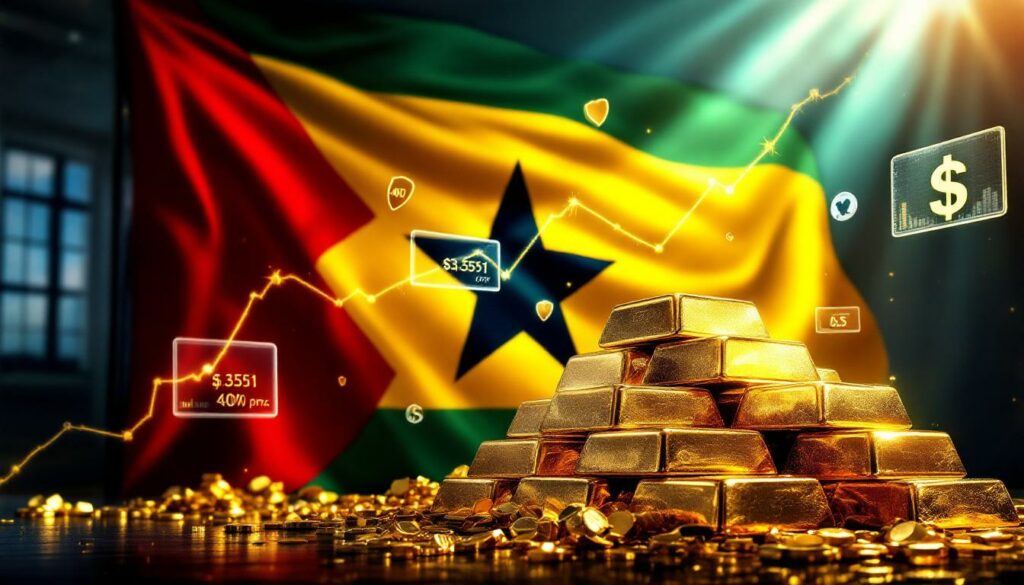Understanding Ghana's Gold Hedging Strategy
Ghana's central bank is implementing a forward-thinking gold price hedging program to safeguard its growing foreign reserves against future market volatility. This strategic initiative comes at a time when the country's gross international reserves have reached $11.1 billion, providing coverage for 4.8 months of imports—a significant improvement in Ghana's economic buffer.
The Bank of Ghana, led by Governor Johnson Asiama, is spearheading this hedging strategy despite currently favorable market conditions. The approach demonstrates Ghana's financial maturity and recognition of commodity market cyclicality.
"While beneficial for now, a future correction in prices could quickly narrow our trade surplus," warns Governor Asiama, highlighting the economic vulnerability that drives this protective measure.
The hedging program aims to lock in current high gold prices analysis through strategic derivative contracts, securing minimum revenue thresholds even if global gold prices experience a downturn. Currently in the development phase, the initiative represents a sophisticated approach to resource wealth management rarely seen in developing economies.
Technical Implementation Details:
- Strategic use of futures contracts to guarantee minimum sale prices
- Options strategies providing downside protection while maintaining some upside potential
- Careful calibration of hedge ratios to balance protection with flexibility
- Phased implementation to avoid market disruption and optimize timing
This hedging strategy marks a significant evolution in Ghana's approach to managing its resource wealth, moving beyond simple extraction and sale toward sophisticated financial risk management.
What Has Driven Ghana's Recent Economic Improvement?
Ghana's economic renaissance in 2025 has been nothing short of remarkable, fueled primarily by extraordinary performance in the gold sector. Gold exports surged by an impressive 76% year-over-year to reach $5.2 billion in just the first four months of 2025, creating a powerful economic catalyst.
This export boom has transformed Ghana's trade balance, widening the trade surplus to $4.1 billion—a dramatic improvement from the $759 million recorded during the same period last year. The strengthened trade position has become a cornerstone of Ghana's economic stability.
The Ghanaian cedi has emerged as a star performer in global currency markets, rallying more than 40% against the US dollar in 2025. This makes it the second-best performing currency worldwide, trailing only the Russian ruble. Such currency strength has significantly improved Ghana's purchasing power on international markets.
Behind these impressive statistics lies a fundamental driver: the remarkable trajectory of gold prices. Gold has climbed 27.7% since January 2025, reaching $3,351 per ounce by July—a historic high that has amplified the value of Ghana's gold exports beyond just production increases.
Key Economic Indicators (2025):
| Indicator | Value | Year-over-Year Change |
|---|---|---|
| Gold Exports (Jan-Apr) | $5.2 billion | +76% |
| Trade Surplus | $4.1 billion | +440% |
| Cedi vs USD | +40% | Second globally |
| Gold Price (July) | $3,351/oz | +27.7% YTD |
The Bank of Ghana attributes this economic turnaround to "increased production and higher prices" that have helped Africa's top gold miner boost its reserves substantially. Additionally, the government's commitment to fiscal consolidation has reinforced investor confidence, creating a virtuous economic cycle.
How Does Gold Production Impact Ghana's Economy?
As Africa's largest gold producer, Ghana's economic fortunes remain inextricably linked to its mining sector. Gold production serves as the backbone of the country's economy, providing critical support across multiple economic dimensions.
Foreign Exchange Generation: Gold exports represent the primary channel through which Ghana accumulates foreign currency reserves. In 2025, this has proven especially valuable as record-high gold prices reached historic highs, accelerating reserve accumulation.
"Gold exports have bolstered the central bank's foreign reserves," notes Bloomberg's Moses Mozart Dzawu, highlighting the direct pipeline from mining operations to national economic stability.
Economic Stabilization Mechanism: The substantial reserves built through gold exports provide Ghana with a crucial buffer against external economic shocks. This protection has become increasingly valuable in an era of global economic uncertainty and supply chain disruptions.
Employment and Community Development: Ghana's gold sector supports tens of thousands of direct jobs and many more indirect employment opportunities. Mining communities benefit from infrastructure development, local procurement, and corporate social responsibility initiatives by major mining companies.
Government Revenue Stream: Through royalties, taxes, and dividends from state participation in mining ventures, gold production generates significant fiscal resources for Ghana's government, supporting public services and development initiatives.
However, this reliance on gold also presents long-term sustainability challenges. The extractive nature of mining means resources will eventually deplete, creating an imperative for Ghana to leverage current gold wealth to develop more diversified economic foundations for future generations.
What Are the Risks to Ghana's Gold-Based Economic Strategy?
Despite the current windfall, Ghana's heavy reliance on gold exports creates significant vulnerabilities that necessitate careful risk management. The Bank of Ghana's hedging initiative acknowledges several key risks inherent in a gold-centric economic strategy.
Price Volatility Exposure: Gold's reputation as a safe-haven asset hasn't immunized it against significant price swings. Governor Asiama explicitly highlighted this concern, noting that "a future correction in prices could quickly narrow our trade surplus." Historical precedent shows gold can experience sharp corrections even during long-term bull markets.
Market Correction Concerns: The 27.7% price surge in 2025 has benefited Ghana enormously, but such rapid appreciation often signals increased correction risk. A sudden reversal could quickly erode Ghana's improved trade position and currency stability.
Implementation Challenges for Hedging: Executing an effective hedging program involves complex timing decisions. Enter too early, and opportunity costs mount if prices continue rising; too late, and protection may prove inadequate against steep declines. Ghana must navigate these technical challenges while building institutional capacity.
Single Commodity Dependency: With 76% of export growth coming from a single commodity, Ghana risks "Dutch disease"—where resource sector success undermines other economic sectors through currency appreciation and resource allocation distortions.
External Market Vulnerabilities:
| Factor | Risk to Ghana |
|---|---|
| Fed Interest Rate Policy | Higher rates typically pressure gold prices |
| Global Risk Sentiment | "Risk-on" market environments reduce safe-haven demand |
| Dollar Strength | Inverse relationship with gold prices |
| Mining Costs | Rising input costs could squeeze profitability |
The planned hedging program represents a sophisticated approach to managing these risks, but successful implementation will require careful calibration and timing to balance downside protection with participation in potential further upside.
How Does Ghana's Approach Compare to Other Gold-Producing Nations?
Ghana's move toward systematic gold price hedging represents a distinctive approach among major gold-producing nations, positioning the country at the forefront of proactive resource management strategies in Africa.
Strategic Positioning: Unlike South Africa, which generally maintains an unhedged exposure to gold prices, Ghana is adopting a more conservative risk management approach. This contrasts with the strategies of other major producers who often accept full price exposure to maximize potential upside.
Reserve Management Philosophy: Ghana's hedging initiative reflects a focus on stability and predictability in foreign reserve accumulation—a priority that differs from countries like Russia and China, which have focused on physical gold accumulation as a strategic diversification from dollar reserves.
Timing Considerations: The decision to implement hedging after prices have already risen substantially differentiates Ghana's approach from producers who typically initiate hedging programs during price troughs or periods of operational distress.
Corporate vs. National Strategies: While major mining companies operating in Ghana (such as Newmont and AngloGold Ashanti) have historically used hedging selectively at corporate levels, Ghana's national-level hedging program represents a more comprehensive approach to managing the country's collective gold price exposure.
Implementation Approach:
| Aspect | Ghana's Approach | Common Alternatives |
|---|---|---|
| Coverage Level | Partial (developing) | Full exposure or complete hedging |
| Market Timing | After price rise | Counter-cyclical or distress-driven |
| Instrument Mix | Multiple derivatives | Single instrument focus |
| Management | Central bank leadership | Treasury or sovereign wealth fund |
Ghana's distinctive approach likely reflects both its economic circumstances and lessons learned from historical hedging programs implemented by other resource-dependent nations, including some that resulted in significant opportunity costs during price rallies.
What Additional Financial Reforms Is Ghana Implementing?
Beyond gold price hedging, Ghana is undertaking significant reforms to modernize its financial sector, with cryptocurrency regulation emerging as a key priority. These complementary initiatives reflect a comprehensive approach to financial stability and innovation.
Cryptocurrency Regulatory Framework: The Bank of Ghana is finalizing a formal oversight framework for digital asset platforms operating within the country. This development acknowledges the growing influence of cryptocurrencies in Ghana's financial landscape.
"It is a fact that crypto is a big thing in Ghana. We can pretend but reality is that it is impacting," Governor Asiama candidly stated, signaling a pragmatic approach to digital asset regulation.
Anti-Money Laundering Focus: The new regulatory framework aims to bring cryptocurrency exchanges under existing financial crime prevention systems. This integration will help address concerns about illicit financial flows while providing clarity for legitimate market participants.
Foreign Exchange Control Integration: Ghana's approach prioritizes ensuring that cryptocurrency innovation supports rather than undermines monetary stability. This involves carefully balancing innovation with protection of the country's foreign exchange regime.
Financial Innovation Balance: Rather than opposing cryptocurrency adoption, Ghana's regulatory approach acknowledges its significant presence in the economy. This balanced perspective seeks to harness the benefits of financial innovation while mitigating associated risks.
Implementation Timeline and Approach:
- Regulatory framework currently in final development stages
- Focus on exchange licensing and compliance monitoring
- Integration with existing financial regulatory infrastructure
- Emphasis on consumer protection and market integrity
These cryptocurrency regulations complement Ghana's gold hedging initiative, forming part of a broader strategy to modernize financial governance while maintaining stability. Together, these reforms demonstrate Ghana's commitment to sophisticated financial management across both traditional and emerging asset classes.
What Are the Broader Implications for Ghana's Economic Future?
Ghana's gold hedging initiative and complementary financial reforms signal a potential inflection point in the country's economic development trajectory, with several important long-term implications.
Fiscal Consolidation Trajectory: The strengthened reserve position provides Ghana with greater fiscal flexibility and negotiating leverage with international creditors. This improved position could accelerate Ghana's fiscal consolidation efforts by reducing borrowing costs and extending debt maturities, creating a more sustainable financial foundation.
Investor Confidence Impact: Ghana's sophisticated approach to resource management, combining production growth with financial risk mitigation, is likely to enhance international investor perception. This could translate into improved sovereign credit ratings, reduced borrowing costs, and increased foreign direct investment across multiple sectors.
Economic Diversification Imperative: Despite current gold sector success, Ghana faces the fundamental challenge of leveraging today's commodity windfall to develop tomorrow's diversified economy. The current strong reserve position provides both resources and time to invest in non-resource sectors capable of generating sustainable growth beyond the commodity cycle.
Long-term Sustainability Considerations: For Ghana's economic strategy to succeed long-term, policy makers must balance immediate benefits of high gold prices with investments in:
- Human capital development through education and healthcare
- Infrastructure to support non-mining economic activities
- Value-added processing of raw materials
- Technology adoption and innovation capacity
Strategic Economic Positioning:
| Time Horizon | Strategic Priority |
|---|---|
| Short-term (1-2 years) | Reserve protection through hedging |
| Medium-term (3-5 years) | Fiscal consolidation and debt sustainability |
| Long-term (5+ years) | Economic diversification and structural transformation |
By building financial buffers during favorable market conditions while simultaneously implementing forward-looking reforms, Ghana is positioning itself to transcend the boom-bust cycles that have historically characterized resource-dependent economies in Africa.
FAQ: Ghana's Gold Market and Economic Strategy
How much have Ghana's gold exports increased in 2025?
Ghana's gold exports surged by 76% year-over-year, reaching $5.2 billion in the first four months of 2025, significantly strengthening the country's trade position and foreign reserves.
What is the current size of Ghana's foreign reserves?
As of July 2025, Ghana's gross international reserves stand at $11.1 billion, providing coverage for 4.8 months of imports, representing a substantial improvement in the country's economic buffer.
Why is Ghana implementing a gold price hedging program?
Despite currently benefiting from high gold prices, Ghana is implementing hedging to protect against future market volatility that could quickly erode its trade surplus and economic gains if prices were to correct downward.
How has Ghana's currency performed in 2025?
The Ghanaian cedi has rallied more than 40% against the US dollar in 2025, making it the second-best performing currency globally after the Russian ruble, supported by improved gold exports and fiscal discipline.
Expert Insights: The Future of Ghana's Gold Strategy
Economic Analysis
Ghana moves to hedge gold price to preserve build-up of reserves represents a forward-thinking approach to resource management. While currently benefiting from favorable market conditions, the strategy acknowledges the inherent volatility of commodity markets and aims to preserve economic gains through strategic risk management.
Market Perspective
The timing of Ghana's hedging initiative coincides with gold price forecast showing continued strength, creating both opportunities and challenges. Effective implementation will require careful consideration of contract structures, timing, and coverage levels to optimize protection without sacrificing upside potential.
Key Statistics: Ghana's Gold Economy in 2025
| Metric | Value | Year-over-Year Change |
|---|---|---|
| Gold Exports (Jan-Apr 2025) | $5.2 billion | +76% |
| Gross International Reserves | $11.1 billion | Significant increase |
| Import Coverage | 4.8 months | Improved position |
| Trade Surplus | $4.1 billion | Up from $759 million |
| Cedi Performance vs USD | +40% | Second-best globally |
| Gold Price (July 2025) | $3,351/oz | +27.7% YTD |
Further Exploration:
Readers interested in learning more about gold market strategies and African economic developments can also explore related educational content from MINING.com, which regularly covers developments in global commodity markets and African mining economies. Furthermore, understanding the CFDs and hedging risks can provide valuable context for Ghana's financial strategy in the commodities market.
Interested in Spotting the Next Major Mineral Discovery?
Discovery Alert's proprietary Discovery IQ model instantly identifies significant ASX mineral discoveries, translating complex data into actionable investment insights for both short-term traders and long-term investors. Explore historic returns from major discoveries at the Discovery Alert discoveries page and gain your market-leading advantage with a 30-day free trial.




